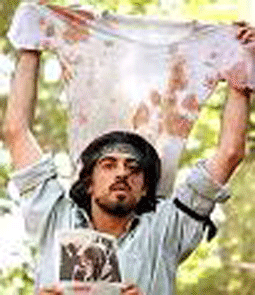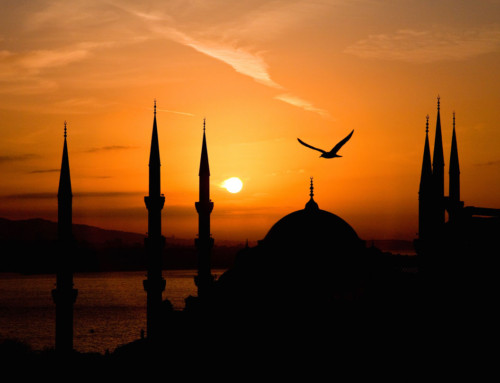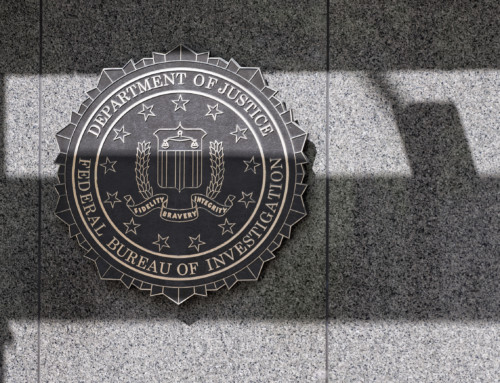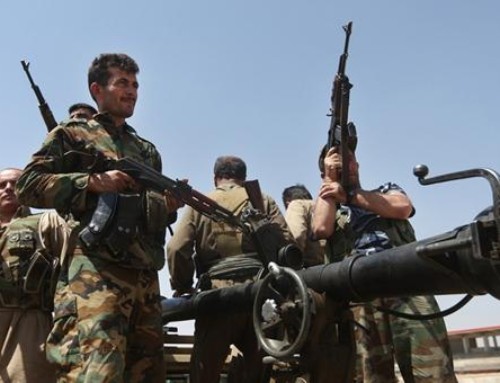More and more Iranians, especially the young, have had enough of this barbarity.
“If we were to take out their nuclear weapons sites militarily, this will backfire on us, and push the Iranian people into the arms of the Mullahs,” said Joe Biden on an August appearance on Tim Russert’s, Meet the Press. While few pundits can now disagree that the road to victory must now run through Tehran, Biden’s mantra is not only suffused with appeasement and capitulation but may very well be false and yet another example of how the anti-Bush herd is undermining our war against militant Islam.
During his presidency of Iran (1992 -2000), Khatami, a putative moderate, ushered in small relaxations in Iran’s hardline theocratic tyranny but finished his tenure by rounding up thousands of journalists, students, and non Muslims, imprisoning, torturing, and tragically executing all too many of them. His regime had a particular fondness for public hangings in the middle of downtown Tehran which is nothing new to those Islamic fundamentalists who know their Koran and the life of the Prophet. After consolidating the conquest of the Arabian subcontinent, Muhammad wrote letters to the Byzantine, and Persian emperors warning them to accept Islam or suffer annihilation. Early this summer, President Bush received a seemingly inchoate letter from Iranian President, Ahmadinejad, which few western pundits fathomed. However, Islamofundamentalists worldwide understood its meaning. It was written in obedience to Islamic dogma which commands the jihadist to follow the prophet and give the infidel one last chance at submission.
One decade after the Prophet’s death, at the battle of Nihavand, when all resistance had collapsed before the armies of Allah, a very long night extended over the ancient Persian lands… Now, after 1,400 years of Islamic rule and 27 years of hyper Islamic rule, more and more Iranians, especially the young, have had enough of this seventh century Bedouin barbarity.
Roya Teimouri is an American/Iranian expatriate living in Southern California who believes that her former country will be free one day. She works to stop the Mullahs from executing her countrymen. Her method is to raise awareness among the international Iranian expatriate community, human rights agencies and international media outlets in an effort to stop the murders. In so doing, she also does her part to destabilize what she knows to be an evil regime.
Ms. Teimouri maintains that the vast majority of Iranians, especially the young, are ready to rise up against the regime and, if America can underwrite the broadcast, over a standard radio band, programs such as the one hosted by Saeed Ghaem-Maghami, a commentator of the Los Angeles based, Farsi-language station, KRSI, the revolution will begin. Her urgent plea is for the U.S. is to invest in the technology necessary to bath her country in anti-regime radio broadcasts which the average Iranian can receive so that they can foment a populous revolution.
Like the Northern Alliance who fought along side the American Special Forces in the conquest of Afghanistan in 2001, there are now also pockets of armed resistance awaiting American intervention. For example, in the mountains of Baluchistan, near the Afghan border, there is an Abdol Malek Riggi, an Iranian Robin Hood, who has begun capturing key government people operating in his region; those government officials who are known to have been involved in the torture and murder of his friends and family.
Kianoosh Sanjari, 24, is a fearless nationally recognized dissident who was imprisoned but is currently free. He was first arrested when he was only 17, held in solitary confinement for many months and at one point was so weakened that he failed to recognize his own mother when she visited him in prison. He is currently free thanks to the efforts of people such as Ms. Teimouri and is amazingly still a political activist, living in Tehran but watched very closely by the regime. In agreeing to be interviewed, he knew that he was risking his life. He spoke to me in Farsi while Ms. Teimouri acted as an interpreter.
He is a spokesman for Democratic Iranians and was recently interviewed on the Iranian televised version of Voice of America. After the broadcast he was arrested but then released. “They watch me closely,” he said.
Sanjari went on to explain that the Iranians will rise up once sanctions have been imposed. “Don’t let the Mullahs travel. Freeze their bank accounts; charge them with crimes against humanity in the international courts. And this will show Iranians that America is truly behind us.”
He said that he was taking a big risk by telling a western reporter that, in his view, the world is in danger that the Europeans and Americans have to understand that they must not let this government buy any more time with talk and negotiations. “We are hoping for the U.S. invasion. We are hoping to be rescued from this prison. But if America only strikes at the weapons plants, the government will take its revenge against us in the resistance.”
Sanjari believes that those Iranians who are not working for the government (approximately 20% of the workforce) are praying for attacks. The leadership of the Revolutionary Guard, who has lands and money outside the country, will flee the country if the U.S. attacks their bases. “If I could speak directly to President Bush and to the American people, I would say that we are ashamed to have this man (Ahmadinejad) as our president.”
Ahmad Batebi is the one the Iranians refer to as the man with the bloody t-shirt. He rose to international prominence in 1998, when the government attacked his dormitory at the University in Tehran. The Mullahs’ police had moved on the building and began beating and shooting the student protestors. When he arrived, seeing a friend who was badly wounded, Batebi brought out his bloody t- shirt to show the crowd which was had assembled outside. His picture appeared on the cover of the Economist Magazine and has since been sent around the world to symbolize and galvanize the Iranian resistance. Shortly thereafter he was arrested and tortured but later released.
When interviewed by satellite phone, he was underground, moving from safe house to safe house, always making sure that there were as few people around him as possible. Like his colleagues, he also firmly believes that, if the bombing of Iran’s nuclear facilities were to be conducted by one or several of the Western powers; this could also ignite the revolution against the Mullahs. “Because the people are under so much pressure after 27 years of this, and because they hate this government so much, they (the Iranian public) are willing and hoping for the attacks. I would say that 90% of Iran would even support an armed invasion by the West,” he said.
He also agreed with Pahlavi, the son of he former Shah, that a nationwide strike will be the best way to bring down the regime but that the Iranian revolutionaries would need communications equipment and some assurances from the U.S. and foreign governments that the strikers would not get rounded up and executed. “One way that we will know that we have support from the West is if the Revolutionary Guard installations are attacked as well as the nuclear weapons sites,” he said.
In short, Batebi and Sanjari concurred with Pahlavi in believing that the nationwide strike could bring down the regime but that the resistance fighters believed that a country-wide strike would only occur if the they were able to communicate via better technology. Secondly, nationwide strikes would likely occur only if they coincided with air attacks on the Revolutionary guard installations and nuclear sites.
Batebi also said that if he could speak directly to President Bush, he would say, “Don’t be fooled. “Don’t make the same mistake as the Europeans who tried to buy their security by doing business with the Mullahs. Please don’t forget about the misery of the Iranian people who have been tortured by this regime for 27 years. Please don’t think about the world’s economy but instead about the freedom from oppression…”
Sadly, shortly after this interview with Ahmad Batebi, he was captured by the regime, beaten badly on the street in front of his wife and taken to a special prison in Tehran for further interrogations. According to what Ms. Teimouri can find out, he is still alive but is suffering from multiple internal injuries and is in poor health.
Jerome Corsi, author of Atomic Iran, maintains that Iran is moving very quickly that they have ordered and are installing 3,000 new centrifuges, piece by piece so as to cloak in secrecy their weapons development. And that when the Israelis know that Iran can make weapons (from enriched uranium) they won’t wait. “I think the clock is ticking down to the end of this year or early next to a time when Israel will have to act. And I think part of Israel’s preemptive attack will be tactical nuclear weapons.”
Ken Timmerman, author of Countdown to Crisis – The Coming Nuclear Showdown with Iran, agreed to comment for this piece on what Senator Joe Biden and so many others have said regarding the possible need for preemptive attacks on the Iranian nuclear sites. “You have to remember that Joe Biden only talks to pro regime groups like the National Iranian American Council. He doesn’t talk to pro democracy groups. I agree with Sanjari, Batebi and Ms. Teimouri. If there are strikes against their nuclear facilities, it will unite the Iranian people against the regime if we also take out the leadership targets.”
NOTE: Publication: Human Events





